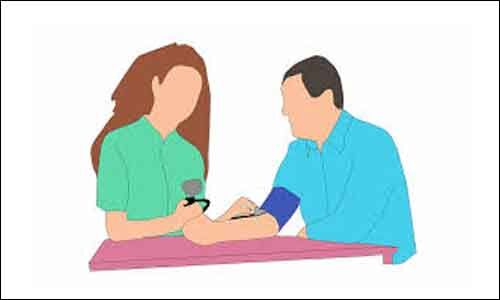- Home
- Medical news & Guidelines
- Anesthesiology
- Cardiology and CTVS
- Critical Care
- Dentistry
- Dermatology
- Diabetes and Endocrinology
- ENT
- Gastroenterology
- Medicine
- Nephrology
- Neurology
- Obstretics-Gynaecology
- Oncology
- Ophthalmology
- Orthopaedics
- Pediatrics-Neonatology
- Psychiatry
- Pulmonology
- Radiology
- Surgery
- Urology
- Laboratory Medicine
- Diet
- Nursing
- Paramedical
- Physiotherapy
- Health news
- Fact Check
- Bone Health Fact Check
- Brain Health Fact Check
- Cancer Related Fact Check
- Child Care Fact Check
- Dental and oral health fact check
- Diabetes and metabolic health fact check
- Diet and Nutrition Fact Check
- Eye and ENT Care Fact Check
- Fitness fact check
- Gut health fact check
- Heart health fact check
- Kidney health fact check
- Medical education fact check
- Men's health fact check
- Respiratory fact check
- Skin and hair care fact check
- Vaccine and Immunization fact check
- Women's health fact check
- AYUSH
- State News
- Andaman and Nicobar Islands
- Andhra Pradesh
- Arunachal Pradesh
- Assam
- Bihar
- Chandigarh
- Chattisgarh
- Dadra and Nagar Haveli
- Daman and Diu
- Delhi
- Goa
- Gujarat
- Haryana
- Himachal Pradesh
- Jammu & Kashmir
- Jharkhand
- Karnataka
- Kerala
- Ladakh
- Lakshadweep
- Madhya Pradesh
- Maharashtra
- Manipur
- Meghalaya
- Mizoram
- Nagaland
- Odisha
- Puducherry
- Punjab
- Rajasthan
- Sikkim
- Tamil Nadu
- Telangana
- Tripura
- Uttar Pradesh
- Uttrakhand
- West Bengal
- Medical Education
- Industry
Breakthrough: Salt causes hypertension via deficiency of anti-aging factor Klotho

Researchers have found for the first time in a new study that Klotho deficiency, an anti-aging factor produced in the kidneys causes aging-associated hypertension through high salt intake. The study has been published in the Journal of Clinical Investigation.
Aging is associated with a high prevalence of hypertension due to elevated susceptibility of BP to dietary salt, but its mechanism is unknown.
High blood pressure is often called a silent killer because it is the biggest risk factor for the most death and disability worldwide including heart disease and stroke, but presents no symptoms as a warning indicator. Many elderly people have high blood pressure that is difficult to treat, and good preventative methods and appropriate markers have not been elucidated.
Klotho is an anti-aging protein that acts as a hormone and is secreted into the blood from the kidneys. Its presence decreases with age causing the vascular and arterial system to stiffen. A recent study had shown the inverse relationship between the Klotho concentration and BP salt sensitivity. Hypertension is caused by excessive intake of salt, but the sensitivity of blood pressure to salt varies from individual to individual, and highly sensitive people are more likely to have high blood pressure.
In general, young people are less sensitive and are unlikely to develop hypertension, whereas older people are more sensitive to salt and are likely to develop hypertension. However, the mechanism of increased salt sensitivity with aging was unknown. Therefore, the research group first confirmed that salt sensitivity increased in aged mice, and revealed that the cause is that the blood concentration of the anti-aging factor Klotho protein decreases with age. Furthermore, the group clarified the molecular mechanism Wnt5a-RhoA pathway for the first time. The results showed that Klotho supplementation could prevent the development of hypertension, and Klotho levels could be a predictive marker for the development of hypertension.
Corresponding author and Specially Appointed Professor Toshiro Fujita of Shinshu University School of Medicine and Research Center for Social Systems, and Division of Epigenetics, Research Center for Advanced Science and Technology, University of Tokyo states that it took time, "to elucidate the molecular mechanism of salt-sensitive hypertension with aging. Although Klotho deficiency was known to activate Wnt signaling, the detailed mechanism by which Wnt activation causes vasoconstriction was unknown. We found that the Wnt signal has two pathways, the canonical pathway which was understood as significant in oncological research, but it took time to demonstrate that the Wnt-RhoA pathway of the non-canonical pathway causes vasoconstriction in cell experiments and mouse experiments."
In experiments using aged mice and cells, abnormal activation of the above pathway could be reversed by supplementation with Klotho protein. As a result, it was possible to establish that the cause of salt-sensitive hypertension due to aging is Klotho protein decline.
The results of this experiment showed that Klotho supplementation could prevent the development of hypertension in the elderly and that Klotho levels could be a predictive marker for the development of hypertension. Trials for human verification is currently underway. Aging, a universal phenomenon causes not only hypertension but dementia and frailty, and impairs the healthy life expectancy of individuals. The aging-related phenomenon of Klotho protein deficiency may be related to the onset of dementia and sarcopenia, or the loss of muscle-mass and usage associated with aging. Its onset mechanism is currently under investigation.
For more details click on the link: https://doi.org/10.1172/JCI134431
Hina Zahid Joined Medical Dialogue in 2017 with a passion to work as a Reporter. She coordinates with various national and international journals and association and covers all the stories related to Medical guidelines, Medical Journals, rare medical surgeries as well as all the updates in the medical field. Email: editorial@medicaldialogues.in. Contact no. 011-43720751
Dr Kamal Kant Kohli-MBBS, DTCD- a chest specialist with more than 30 years of practice and a flair for writing clinical articles, Dr Kamal Kant Kohli joined Medical Dialogues as a Chief Editor of Medical News. Besides writing articles, as an editor, he proofreads and verifies all the medical content published on Medical Dialogues including those coming from journals, studies,medical conferences,guidelines etc. Email: drkohli@medicaldialogues.in. Contact no. 011-43720751


